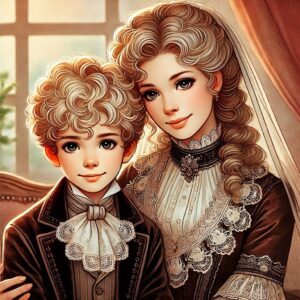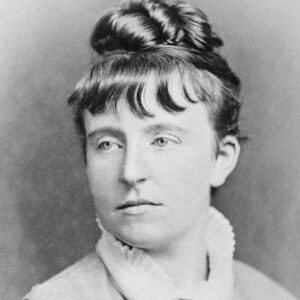
Introdução à Obra “Little Lord Fauntleroy”
“Little Lord Fauntleroy”, ou “O Pequeno Lorde”, é um clássico da literatura infantil, escrito por
e publicado originalmente em 1886 – hoje em domínio público. A obra conta a história de Cedric Errol, um menino americano de origem humilde que descobre ser herdeiro de um grande título nobiliárquico na Inglaterra. Repleto de lições sobre bondade, empatia e generosidade, o livro narra a jornada de Cedric para se adaptar à sua nova vida como Lorde Fauntleroy, enquanto tenta conquistar o coração endurecido de seu avô, o Conde de Dorincourt.
Mais do que uma narrativa sobre ascensão social, “Little Lord Fauntleroy” é uma celebração dos valores humanos e do impacto positivo que a pureza e a bondade podem exercer sobre os outros, tornando-se uma obra atemporal que continua a encantar leitores de todas as idades.
“Little Lord Fauntleroy” é uma obra que transita entre duas culturas, refletindo a própria trajetória de sua autora, Frances Hodgson Burnett. Nascida na Inglaterra em 1849, Burnett mudou-se para os Estados Unidos ainda na juventude, o que influenciou profundamente sua visão de mundo e sua escrita.

O livro foi publicado originalmente nos Estados Unidos, em 1886, e é frequentemente associado à literatura norte-americana por conta de sua linguagem e de elementos que refletem a cultura dos EUA, como a infância de Cedric em um ambiente simples e caloroso em Nova York. No entanto, o enredo central da história, que leva Cedric à Inglaterra para assumir seu título como herdeiro de um conde, conecta a obra às tradições e valores da aristocracia britânica.
Essa fusão entre os cenários americano e inglês faz de “Little Lord Fauntleroy” uma obra binacional, destacando as diferenças e os pontos de encontro entre as culturas dos dois países. É um livro que dialoga com leitores dos dois lados do Atlântico, celebrando valores universais como a bondade e a generosidade.
Abaixo está o capítulo 1 do livro, adaptado por mim, para o nível A2 no Quadro Europeu Comum de Referência para Línguas (CEFR) é considerado um nível “Elementary”, que vem logo após o nível A1 (Beginner).
PEOPLE IN THIS STORY
- Cedric (Ceddie) Errol, Lord Fauntleroy, grandson of the Earl of Dorincourt
- Mrs Errol (Dearest), Cedric’s mother, and wife of the youngest son of the Earl of Dorincourt
- Mr Errol, (now dead) Cedric’s father, and the youngest son of the Earl
- IN AMERICA
- Mr Hobbs, a man with a grocery store in Cedric’s street; a friend of Cedric’s
- Dick, a boot-black; a friend of Cedric’s
- Ben, Dick’s brother, living in California
- Minna, Ben’s wife, address unknown
- Bridget, a woman with twelve children; a friend of Cedric’s
- IN ENGLAND
- The Earl of Dorincourt, Cedric’s grandfather
| Bevis Maurice |
} | (now dead) the two older sons of the Earl |
- Mr Havisham, lawyer for the Earl of Dorincourt
- Mr Newick, rent collector for the Earl of Dorincourt
- Mr Dawson, vicar at Dorincourt
- Mr Higgins, a farmer at Dorincourt
- Servants at Dorincourt Castle
- Villagers at Dorincourt
CHAPTER 1
A big surprise
Cedric did not know anything about it. No one had ever told him. He only knew that his father had been an Englishman because his mother told him. But his father had died when Cedric was very small. He could not remember much about him. He only remembered that his father was tall, had blue eyes, and a long mustache. He also remembered that it was fun to be carried around on his father’s shoulders.
Since his father’s death, Cedric had learned not to talk about him to his mother. When his father was sick, Cedric was sent away. When he came back, everything had changed. His father was gone, and his mother was very sad. She sat by the window, pale and thin. Her pretty smile and dimples were gone, and her big eyes looked sad. She wore black clothes all the time.
“Dearest,” Cedric said to her one day. (His father had called her that, so Cedric called her that too.) “Dearest, is my papa better now?”
His mother held him tightly. Cedric turned his curly head to look at her face. She looked so sad that it made him want to cry.
“Dearest,” he asked again, “is he well?”
Suddenly, Cedric put his arms around her neck and kissed her many times. He wanted to make her feel better. She started to cry and hugged him tightly.
“Yes, he is well,” she said through her tears. “He is very well now. But we… we only have each other now. There is no one else.”
Cedric was very young, but he understood. His big, strong father would not come back. He had died, like other people Cedric had heard about. But Cedric did not really understand why this had happened or why it made everyone so sad.
Because his mother cried every time Cedric talked about his father, he decided not to mention him. He also noticed that it was better not to let her sit quietly, staring at the fire or out the window. They lived alone and did not have many friends. Cedric did not know they were lonely because he was always happy to be with his mother.
His mother and father had married even though it made some people angry. The person who was the angriest was Cedric’s grandfather. He was a rich and important man in England. He was an earl, which was a very high title. But he was also very bad-tempered and did not like Americans.
Cedric’s father, Captain Cedric, was the youngest of the earl’s three sons. The oldest son would inherit the title and the family’s big house and money. If the oldest son died, the second son would get everything. Cedric’s father had little chance of becoming rich or important.
But Cedric’s father had something his brothers did not. He was handsome, with a bright smile and a kind heart. He was brave and friendly, and everyone liked him. His older brothers were not handsome or kind. They were not very clever either. When they were young, they wasted time and money and made their father angry. The earl was often disappointed in them. He thought they would not be good heirs to his title or property.
Sometimes, the earl felt angry at his youngest son for being so good-looking and kind. But deep down, he cared about him the most. One day, he sent Captain Cedric to America. He wanted to stop feeling jealous of his youngest son. But after a few months, the earl missed him and wrote a letter asking him to come back.
Captain Cedric’s reply was a big surprise. He wrote to say he was getting married to a beautiful American woman. This made the earl very angry. He wrote back, saying he never wanted to see his son again. He told him to stay in America and never return to England. He said he would never help him with money or anything else.
This letter made Captain Cedric very sad. He loved his father and missed his home in England. But he knew he could not change his father’s mind. So he sold his position in the English army and moved to New York. He got a job and married the woman he loved.
They lived in a small house on a quiet street. Soon, Cedric was born, and everything was happy. Cedric’s mother was kind and cheerful, and Cedric was a very happy baby. Everyone who met him liked him because he smiled at everyone, even strangers. People in the neighborhood thought he was charming. Even the grumpy grocer liked him. Cedric grew more handsome and friendly every year.
When Cedric was old enough to walk, he liked to pull a small wagon while wearing a white outfit and a big hat. He looked so cute that people stopped to admire him. His nurse told his mother about the people who smiled and talked to Cedric. He made friends everywhere because he was cheerful and kind.
He was like this because of his parents. They were always polite and loving to each other and to him. Cedric grew up in a house full of kindness. He always heard nice words and saw loving actions. He copied what he saw. He called his mother “Dearest,” just like his father did. He also took care of her, as his father had done.
When Cedric realized his father would never come back, he tried to make his mother happy. He was too young to do much, but he did what he could. He brought her toys, sat quietly beside her, and kissed her often. She told their servant, Mary, that Cedric seemed to understand her sadness.
As Cedric grew older, he became even more interesting to people. He was a good companion to his mother. He learned to read when he was very young. In the evenings, he liked to read stories or newspapers out loud to his mother. She often laughed at his funny ideas.
One day, Cedric surprised Mary, the servant, by asking her if she was a “Republican.” He explained that he and his mother supported the same political party. Mary laughed and told him she was a Democrat. Cedric looked serious and told her, “The country will go to ruin!” Mary was very proud of him, especially his curly hair and pretty manners.
Cedric did not know he looked like a young lord. He didn’t even know what a lord was. His best friend was Mr. Hobbs, the grocer. Mr. Hobbs was not very nice to most people, but he liked Cedric. Cedric spent a lot of time at the store, talking to Mr. Hobbs about politics and history.
One day, something very strange happened. It would change Cedric’s life forever.
****
VOCABULÁRIO
dimples – pequenas covinhas (pequenos “buracos” nas bochechas que aparecem ao sorrir).
Dearest – [superlativo] a mais querida; usada como um termo carinhoso.
angriest – o mais raivoso (superlativo de “angry”).
earl – conde (título de nobreza no Reino Unido).
inherit – herdar (receber algo como dinheiro ou propriedade após a morte de alguém).
grumpy – rabugento, mal-humorado.
wagon – carrinho (uma pequena carroça ou veículo usado para transportar coisas).
cheerful – alegre, animado.
Democrat – democrata (membro de um partido político nos Estados Unidos).
Republican – republicano (outro partido político nos Estados Unidos).
